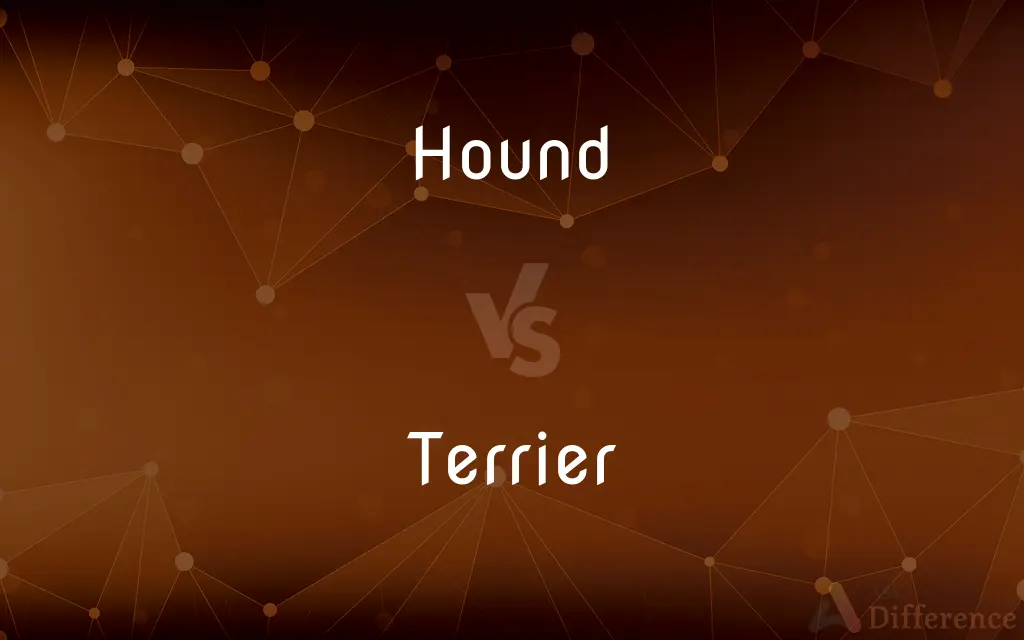Hound vs. Terrier — What's the Difference?
Edited by Tayyaba Rehman — By Urooj Arif — Updated on March 27, 2024
Hound breeds are known for their hunting skills, particularly using scent or sight, while Terriers are bred mainly for hunting and killing vermin. Hounds typically show more independence in tasks, whereas Terriers exhibit tenacity and boldness.

Difference Between Hound and Terrier
Table of Contents
ADVERTISEMENT
Key Differences
Hound breeds are primarily designed to hunt prey either by sight or scent, showcasing remarkable endurance and speed in the field. On the other hand, Terriers are small to medium-sized dogs developed to hunt and kill vermin, displaying an energetic and fearless character.
Hounds tend to be more independent and less inclined to seek constant approval from their owners, reflecting their breeding to make decisions during the hunt. Whereas Terriers, despite their independence in hunting, often seek more interaction and approval from their owners, showing a more personable and engaging behavior.
While Hounds are usually classified into two main types: sight hounds and scent hounds, each type is specialized for tasks leveraging their exceptional vision or sense of smell, respectively. Terriers, however, do not have such a distinction and are primarily known for their digging ability and tenacity.
The temperament of Hound breeds is often laid-back and reserved, especially when compared to Terriers. Terriers are known for their spirited, energetic personality, often displaying a higher level of assertiveness and barking.
In terms of physical exercise, Hounds require regular, but not necessarily intense, physical activities to satisfy their tracking instincts. Terriers, however, need a vigorous exercise regime to manage their high energy levels and to fulfill their instinctual need to hunt and dig.
ADVERTISEMENT
Comparison Chart
Primary Purpose
Hunting by scent or sight
Hunting and killing vermin
Temperament
Independent, can be reserved
Energetic, fearless, and assertive
Exercise Needs
Regular but moderate
High and intense
Interaction
Less inclined for constant approval
Seeks more interaction and approval
Hunting Style
Uses sight or scent to track prey
Uses tenacity to dig and kill vermin
Compare with Definitions
Hound
A type of dog used for hunting, either by sight or scent.
The Beagle, a scent hound, is excellent at tracking rabbits.
Terrier
Exhibits a bold and energetic personality.
Terriers often display a fearless approach to challenges.
Hound
Often have a laid-back and independent temperament.
Despite their size, most hounds are quite gentle and independent.
Terrier
A small to medium-sized dog breed known for hunting and killing vermin.
The Jack Russell Terrier is adept at flushing out foxes.
Hound
Dogs that are bred and trained primarily for hunting.
The Greyhound, a sight hound, is known for its speed and agility.
Terrier
Typically has a strong digging instinct.
It's not uncommon to find Terriers digging holes in the backyard.
Hound
Characterized by their endurance and specialized hunting skills.
Bloodhounds are renowned for their ability to track scents over long distances.
Terrier
Needs a lot of exercise and stimulation.
Terriers require plenty of playtime to burn off their abundant energy.
Hound
Require regular exercise to satisfy their hunting instincts.
Daily walks are essential for keeping a hound physically and mentally stimulated.
Terrier
Seeks interaction and approval from their owners.
Despite their independence, Terriers enjoy engaging with their human companions.
Hound
A hound is a type of hunting dog used by hunters to track or chase prey.
Terrier
Terrier (from the French word terrier [tɛʁje], meaning "burrow") is a type of dog originally bred to hunt vermin. A terrier is a dog of any one of many breeds or landraces of the terrier type, which are typically small, wiry, game, and fearless.
Hound
A domestic dog of any of various breeds commonly used for hunting, characteristically having drooping ears, a short coat, and a deep resonant voice.
Terrier
A dog of any of various typically small, active breeds originally developed for driving game from burrows.
Hound
A dog.
Terrier
A dog from a group of small, lively breeds, originally bred for the hunting of burrowing prey such as rats, rabbits, foxes, and even otters; this original function is reflected in some of their names (e.g. rat terrier).
Hound
A contemptible person; a scoundrel.
Terrier
Someone displaying terrier-like qualities.
Hound
One who eagerly pursues something
A gossip hound.
Terrier
A collection of acknowledgments of the vassals or tenants of a lordship, containing the rents and services they owed to the lord, etc.
Hound
A devotee or an enthusiast
A coffee hound.
Terrier
(legal) An inventory (book or roll) in which the lands of private persons or corporations are described by their site, boundaries, number of acres, etc.; a terrar.
Hound
To pursue relentlessly and tenaciously
The suspect was hounded by the police for weeks.
Terrier
An auger or borer.
Hound
To make repeated demands of or subject to persistent criticism
Her parents hounded her until she agreed to look for a better job.
Terrier
An auger or borer.
Hound
To pressure or force from a place or situation
Accusations that hounded him out of office.
Terrier
One of a breed of small dogs, which includes several distinct subbreeds, some of which, such as the Skye terrier and Yorkshire terrier, have long hair and drooping ears, while others, at the English and the black-and-tan terriers, have short, close, smooth hair and upright ears.
Hound
A dog, particularly a breed with a good sense of smell developed for hunting other animals.
Terrier
Formerly, a collection of acknowledgments of the vassals or tenants of a lordship, containing the rents and services they owed to the lord, and the like.
Hound
Any canine animal.
Terrier
Any of several usually small short-bodied breeds originally trained to hunt animals living underground
Hound
(by extension) Someone who seeks something.
Hound
(by extension) A male who constantly seeks the company of desirable women.
Hound
A despicable person.
Hound
A houndfish.
Hound
Projections at the masthead or foremast, serving as a support for the trestletrees and top to rest on; foretop
Hound
A side bar used to strengthen portions of the running gear of a vehicle.
Hound
(transitive) To persistently harass.
He hounded me for weeks, but I was simply unable to pay back his loan.
Hound
(transitive) To urge on against; to set (dogs) upon in hunting.
Hound
A despicable person.
Hound
A houndfish.
Hound
Projections at the masthead, serving as a support for the trestletrees and top to rest on.
Hound
A side bar used to strengthen portions of the running gear of a vehicle.
Hound
To set on the chase; to incite to pursuit; as, to hounda dog at a hare; to hound on pursuers.
Hound
To hunt or chase with hounds, or as with hounds.
Hound
Any of several breeds of dog used for hunting typically having large drooping ears
Hound
Someone who is morally reprehensible;
You dirty dog
Hound
Pursue or chase relentlessly;
The hunters traced the deer into the woods
The detectives hounded the suspect until they found the him
Common Curiosities
What's the main purpose of Hound breeds?
Hound breeds are primarily used for hunting prey, utilizing their keen sense of sight or smell.
Do Hounds need a lot of exercise?
Hounds require regular but moderate exercise to keep them healthy and satisfy their instinctual needs.
Is it true that Terriers bark a lot?
Many Terriers are vocal and may bark more than some other breeds, often due to their alert and active nature.
What makes Terriers unique compared to other dog breeds?
Terriers are uniquely bold, energetic, and tenacious, making them excellent for tasks like hunting vermin.
How do Terriers differ from Hounds in hunting?
Terriers are bred to hunt and kill vermin, often digging to pursue their quarry, unlike Hounds that track by scent or sight.
What are some examples of Hound breeds?
Examples include the Beagle, hound, and Greyhound.
Can Hounds be good in urban environments?
Yes, many Hound breeds can adapt well to urban living, provided they get enough physical and mental stimulation.
Are Terriers good family pets?
Yes, Terriers can make great family pets, thanks to their energetic and engaging personality.
How do Hounds behave around children and other pets?
Hounds are typically gentle and can be good with children and other pets, though their hunting instincts may affect interactions with small animals.
What are some activities suitable for Terriers?
Terriers enjoy activities that satisfy their digging instincts and need for vigorous exercise, like agility training.
Are Terriers easy to train?
Terriers can be challenging to train due to their independent and sometimes stubborn nature.
What type of grooming do Hounds need?
Grooming requirements for Hounds vary by breed but generally include regular brushing and bathing.
Do all Hounds have a strong scent-tracking ability?
While scent hounds are renowned for their tracking ability, not all Hounds rely on scent to the same extent.
Are Hounds suitable for first-time dog owners?
Hounds can be suitable for first-time owners, but their independent nature and exercise needs should be considered.
How much outdoor space do Terriers need?
Terriers benefit from having outdoor space to explore and play, but many can adapt to living in smaller spaces with adequate exercise.
Share Your Discovery

Previous Comparison
Colours vs. Colour
Next Comparison
Stave vs. StaffAuthor Spotlight
Written by
Urooj ArifUrooj is a skilled content writer at Ask Difference, known for her exceptional ability to simplify complex topics into engaging and informative content. With a passion for research and a flair for clear, concise writing, she consistently delivers articles that resonate with our diverse audience.
Edited by
Tayyaba RehmanTayyaba Rehman is a distinguished writer, currently serving as a primary contributor to askdifference.com. As a researcher in semantics and etymology, Tayyaba's passion for the complexity of languages and their distinctions has found a perfect home on the platform. Tayyaba delves into the intricacies of language, distinguishing between commonly confused words and phrases, thereby providing clarity for readers worldwide.
















































